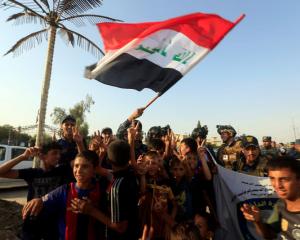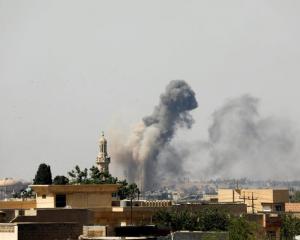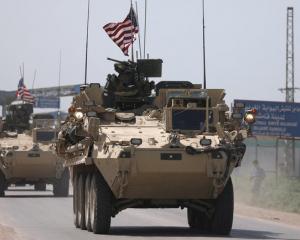A car bomb has exploded at an open-air market crowded with shoppers in a Shiite town northeast of Baghdad, killing 23 people and wounding more than 50, Iraqi police and hospital officials said.
The bombing struck the town of Khalis, a Shiite enclave 80km north of Baghdad surrounded by the largely Sunni province of Diyala. It is a former al-Qaida in Iraq stronghold that has seen several powerful blasts, one a twin bombing on a restaurant in March that killed 57.
Most of those killed were sitting in a cafe in the centre of the market that was reduced to rubble.
"There was a sudden explosion followed by heavy shooting with smoke, fire and yelling, then sirens, ambulances, police," said Yasser Mohammed, a 28-year-old blacksmith who walked by the cafe minutes before the blast.
"There was a frightening scene, mostly women running to the scene I assume to look for their husbands or sons who go to the cafe to play dominos, backgammon, or poker".
Abdul Rahman al-Dieni, a 46-year-old teacher, was in a nearby grocery store when he heard the explosion. He thought the attackers targeted the town's police headquarters just a few yards away from the cafe.
"I ran to where the screaming was coming from and saw the cafe was completely destroyed," al-Dieni said.
The dead and wounded were taken to the nearby city of Baqouba, said city officials who spoke on condition of anonymity because they were not authorised to speak to the media.
While violence has fallen dramatically in Iraq since the height of the insurgency in 2006 and 2007, there are fears that militants are taking advantage of political uncertainty after an inconclusive election to try to destabilise the country.
Shiites were also the main targets in a string of attacks across the country two weeks ago that killed 119 people, the worst day of violence this year.
A Sunni-backed coalition won the most seats in Iraq's March 7 parliamentary election. But there are concerns that Sunnis could still end up largely excluded from power after two Shiite blocs made an alliance that will likely lead to them forming the next government.
Sunni anger over being largely excluded from government after the US-led invasion in 2003 was seen as a key reason behind sectarian violence that brought Iraq to the brink of civil war during the insurgency.









